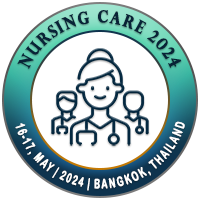
Mr. Abdullah Tawfiq Obaid
Shaikh Shakhbout Medical City, UAETitle: Chemotherapy-induced peripheral neuropathy assessment and nursing implications
Abstract
Chemotherapy-induced peripheral neuropathy (CIPN) is one of the most disturbing and dose-limiting side effects of anticancer therapies. It produces multidimensional neurological and muscular symptoms as a result of nerve damage or impairment in the peripheral nerve function which interfere with the patients’ daily life. Despite the numerous established and validated tools such as the Quality of Life Questionnaire Chemotherapy-Induced Peripheral Neuropathy 20 (QLQ-CIPN20), Chemotherapy-Induced Peripheral Neuropathy Assessment Tool (CIPNT), and the Functional Assessment of Cancer Therapy/Gynecologic Oncology Group-Taxane subscale, the majority of these tools were validated for a specific tumor type or chemotherapeutic agent, and they are not frequently used in clinical settings. The Arabic versions of QLQ-CIPN20 and CIPNT showed adequate reliability and validity to screen for CIPN symptoms and their interference in Arab countries.
Evidence of patient reported outcome measures use in clinical practice is limited and their adoption to individual-patient level management requires more evaluation. Healthcare providers are encouraged to integrate the patient reported tool with physical examination and use it as part of routine assessment. Using an appropriate practice guidelines as well as a simplified approach to CIPN assessment are recommended for nurses working in the busy chemotherapy units. This review aims to provide an evidence synthesis that prepares nurses to comprehensively assess, provide supportive care for, and critically evaluate evidence about Patient reported outcome measures. Incidence, prevalence, mechanisms, and risk factors of CIPN will be discussed.
Nurses play a critical role as they are at the forefront of providing care for patients at risk of developing CIPN by performing the initial and ongoing assessment before initiating chemotherapy. Proactive patient education and nursing assessment and intervention of CIPN allows early detection of CIPN and makes it possible to prevent worsening of the symptoms.
Biography
Abdullah Obaid has completed his Bachelor Degree in nursing in 2008 from Al Al Bait University, Jordan. And his Master degree in nursing oncology in 2016 from The Hashemite University, Jordan. Then in 2017 he completed a professional diploma in pain management. He is Charge Nurse in the pain management team at Shaikh Shakhbout Medical City. He has 10 publications in peer reviewed journals.

